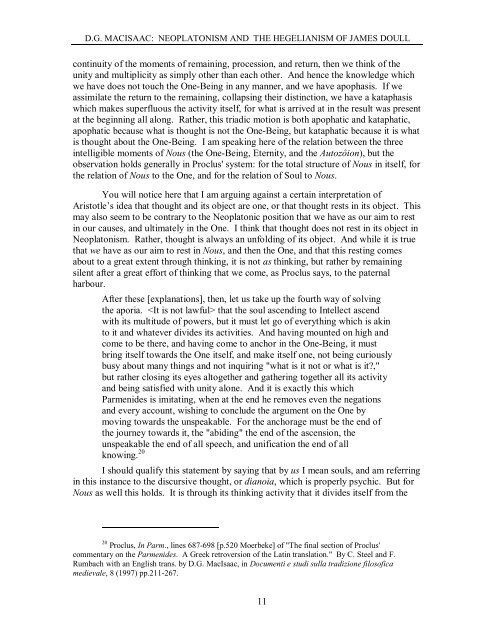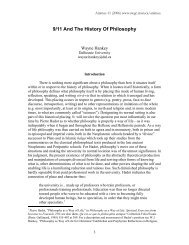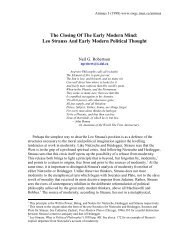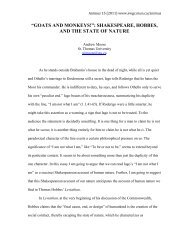Neoplatonism And The Hegelianism Of James Doull1
Neoplatonism And The Hegelianism Of James Doull1
Neoplatonism And The Hegelianism Of James Doull1
You also want an ePaper? Increase the reach of your titles
YUMPU automatically turns print PDFs into web optimized ePapers that Google loves.
D.G. MACISAAC: NEOPLATONISM AND THE HEGELIANISM OF JAMES DOULLcontinuity of the moments of remaining, procession, and return, then we think of theunity and multiplicity as simply other than each other. <strong>And</strong> hence the knowledge whichwe have does not touch the One-Being in any manner, and we have apophasis. If weassimilate the return to the remaining, collapsing their distinction, we have a kataphasiswhich makes superfluous the activity itself, for what is arrived at in the result was presentat the beginning all along. Rather, this triadic motion is both apophatic and kataphatic,apophatic because what is thought is not the One-Being, but kataphatic because it is whatis thought about the One-Being. I am speaking here of the relation between the threeintelligible moments of Nous (the One-Being, Eternity, and the Autozôion), but theobservation holds generally in Proclus' system: for the total structure of Nous in itself, forthe relation of Nous to the One, and for the relation of Soul to Nous.You will notice here that I am arguing against a certain interpretation ofAristotle’s idea that thought and its object are one, or that thought rests in its object. Thismay also seem to be contrary to the Neoplatonic position that we have as our aim to restin our causes, and ultimately in the One. I think that thought does not rest in its object in<strong>Neoplatonism</strong>. Rather, thought is always an unfolding of its object. <strong>And</strong> while it is truethat we have as our aim to rest in Nous, and then the One, and that this resting comesabout to a great extent through thinking, it is not as thinking, but rather by remainingsilent after a great effort of thinking that we come, as Proclus says, to the paternalharbour.After these [explanations], then, let us take up the fourth way of solvingthe aporia. that the soul ascending to Intellect ascendwith its multitude of powers, but it must let go of everything which is akinto it and whatever divides its activities. <strong>And</strong> having mounted on high andcome to be there, and having come to anchor in the One-Being, it mustbring itself towards the One itself, and make itself one, not being curiouslybusy about many things and not inquiring "what is it not or what is it?,"but rather closing its eyes altogether and gathering together all its activityand being satisfied with unity alone. <strong>And</strong> it is exactly this whichParmenides is imitating, when at the end he removes even the negationsand every account, wishing to conclude the argument on the One bymoving towards the unspeakable. For the anchorage must be the end ofthe journey towards it, the "abiding" the end of the ascension, theunspeakable the end of all speech, and unification the end of allknowing. 20I should qualify this statement by saying that by us I mean souls, and am referringin this instance to the discursive thought, or dianoia, which is properly psychic. But forNous as well this holds. It is through its thinking activity that it divides itself from the20 Proclus, In Parm., lines 687-698 [p.520 Moerbeke] of "<strong>The</strong> final section of Proclus'commentary on the Parmenides. A Greek retroversion of the Latin translation." By C. Steel and F.Rumbach with an English trans. by D.G. MacIsaac, in Documenti e studi sulla tradizione filosoficamedievale, 8 (1997) pp.211-267.11
















